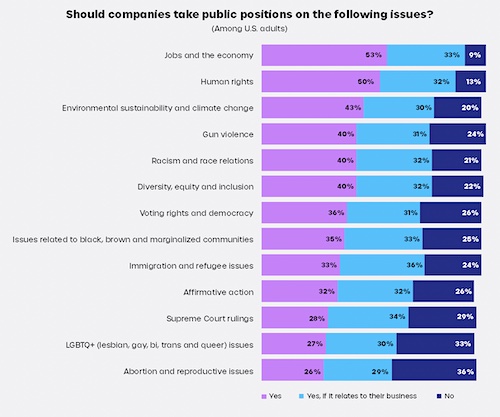 |
Both consumers and employees increasingly expect companies to be engaged on social topics, according to the results of a new survey from Weber Shandwick, KRC Research, Powell Tate and United Minds.
“Pulse on America: Public and Employee Opinions on Business and Societal Issues” asked over 1,000 consumers, as well as 501 company employees, how a company’s willingness to take a stand on such hot-button topics as human rights, gun violence, racism, immigration and LGBTQ+ issues affect their opinion of that company.
On the employee side, job satisfaction appears to be a big plus of corporate activism. More than eight out of 10 (84 percent) of employees at companies with leaders who speak up on critical events and issues reported being satisfied with their jobs. That compares with only 57 percent for employees in companies who leaders do not speak up on those issues.
The workplace itself is seen as something of a haven from the contentious nature of the current political landscape. While more than half of the consumers surveyed (58 percent) said the general tone in the country today is not “civil and respectful,” 79 percent of the employees said that their workplace remained a civil environment.
 |
However, the 27 percent of employees who reported having heard their company referred to as “woke” had varying views of the effect of that term. Close to a third (31 percent) said that the “woke” label would make them “proud of my company.” However, 19 percent said that it would make then “embarrassed for my company” and 16 percent said it would make them “ashamed to work for my company.”
A considerable number also said that working for a company considered woke could make the company a “target of aggression and harassment” (27 percent) or could make employees themselves targets (22 percent).
The risks that companies take with consumers when it comes to voicing political or social opinions are a double-edged sword for companies as well. More than half of consumers said they had taken action to oppose or support a company based on its positions or actions. About four in 10 (44 percent) said they had boycotted a company, while 36 percent have steered their purchase decisions toward companies with views that they share. A quarter of them (25 percent) have participated in both activities.
“Silence is an increasingly fraught option,” said Weber Shandwick chief public affairs officer Pam Jenkins. “These findings show that effective leaders recognize meaningful signals and bring clarity amid the noise surrounding social issues. Instead of retreating, they are creating thriving workplaces and earning brand loyalty and strong reputations by listening to their stakeholders and tackling tough issues head on.”
The Weber Shandwick study was conducted between July 7 and 10.


 Consumers who once demanded convenience now require consistent, multi-channel experiences that cater to them at every point. Brands must have a clear, audience-appropriate, and channel-specific voice across all platforms.
Consumers who once demanded convenience now require consistent, multi-channel experiences that cater to them at every point. Brands must have a clear, audience-appropriate, and channel-specific voice across all platforms. Employees at U.S. companies are experiencing high levels of burnout, but managers are lagging behind when it comes to their awareness of the problem
Employees at U.S. companies are experiencing high levels of burnout, but managers are lagging behind when it comes to their awareness of the problem Brand has a powerful effect on a company’s valuation, but the level of brand understanding in the investment community leaves a lot to be desired, according to a new study from Brodeur Partners, Interbrand and NewtonX.
Brand has a powerful effect on a company’s valuation, but the level of brand understanding in the investment community leaves a lot to be desired, according to a new study from Brodeur Partners, Interbrand and NewtonX. AI may still be viewed with a wary eye by most media pros, but its use is growing, according to a new study from Muck Rack.
AI may still be viewed with a wary eye by most media pros, but its use is growing, according to a new study from Muck Rack. A new study from Walker Sands says that some marketers have been putting the cart before the horse when it comes to the relationship between marketing channels and business outcomes.
A new study from Walker Sands says that some marketers have been putting the cart before the horse when it comes to the relationship between marketing channels and business outcomes.


 Have a comment? Send it to
Have a comment? Send it to 
No comments have been submitted for this story yet.